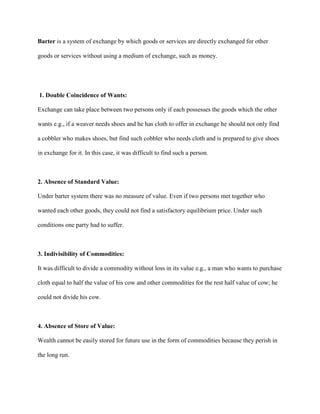
Barter system notes now
- 1. Barter is a system of exchange by which goods or services are directly exchanged for other goods or services without using a medium of exchange, such as money. 1. Double Coincidence of Wants: Exchange can take place between two persons only if each possesses the goods which the other wants e.g., if a weaver needs shoes and he has cloth to offer in exchange he should not only find a cobbler who makes shoes, but find such cobbler who needs cloth and is prepared to give shoes in exchange for it. In this case, it was difficult to find such a person. 2. Absence of Standard Value: Under barter system there was no measure of value. Even if two persons met together who wanted each other goods, they could not find a satisfactory equilibrium price. Under such conditions one party had to suffer. 3. Indivisibility of Commodities: It was difficult to divide a commodity without loss in its value e.g., a man who wants to purchase cloth equal to half the value of his cow and other commodities for the rest half value of cow; he could not divide his cow. 4. Absence of Store of Value: Wealth cannot be easily stored for future use in the form of commodities because they perish in the long run.
- 2. Many difficulties were faced during barter transactions. Generally, the main difficulties faced were as follows: 1. Lack of Double Coincidence of Wants: Barter transactions can be possible only when two persons desiring exchange of commodities should have such commodities which are mutually needed by each other. For example, if Ram wants cloth, which Shyma has, then Ram should have such commodity which Shyam wants. In the absence of such coincidence of wants, there will be no exchange. However, it is very difficult to find such persons where there is coincidence of wants. One had to face such difficulties in barter economy because of which this system had to be abandoned. 2. Luck of Division: The second difficulty of barter exchange relates to the exchange of such commodities which cannot be divided. For example, a person has a cow and he wants cloth, food grains and other items of consumption. Under such a condition, exchange can be possible only when he discovers a person, who is in need of a cow and has all such commodities, but it is very difficult to get such a person. Then how to affect the exchange. Similarly the second problem relates to the exchange of such commodities which cannot be divided into pieces, because in this kind of situation, a big commodity like cow cannot be divided into small pieces for making payment of the goods of smaller value. 3. Lack of a Common Measure of Value: The biggest problem in the barter exchange was the lack of common measure of value i.e., there was no such commodity in lieu of which all commodities could be bought and sold. In such a situation, while facilitating the exchange of a commodity its value was to be expressed in all commodities, such as one yard cloth is equal to ½ kilogram of potato etc. It was a very difficult proposition and made exchange virtually impossible. Now, with the discovery of money, this difficulty has been totally eliminated. 4. Lack of Store of Value: In a barter economy, the store of value could be done only in the form of commodities. However, we all know that commodities are perishable and they cannot be kept for a long time in the store. Because of this difficulty, the accumulation of capital or store of value was very difficult and without the accumulation of capital, economic progress could not be made. It is because of this reason that as long as barter system continued, significant progress was not made in the world anywhere.